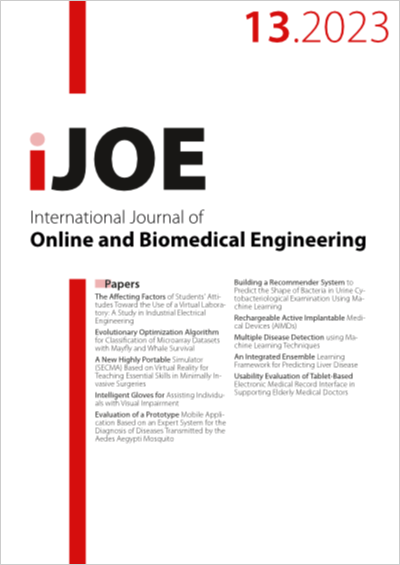A New Highly Portable Simulator (SECMA) Based on Virtual Reality for Teaching Essential Skills in Minimally Invasive Surgeries
DOI:
https://doi.org/10.3991/ijoe.v19i13.40897Keywords:
Virtual Reality Simulator for education, surgical simulation, simulation training, minimally invasive surgeryAbstract
This study presents a new minimal access surgery training system, SECMA, and its constructive validation to determine its usefulness for training basic laparoscopic skills. SECMA is an affordable, highly portable, mobile virtual reality training tool for laparoscopic techniques that integrates the Oculus Quest with a mechanical interface for surgeon simulation of forceps using the hand controllers of these devices. It allows the execution of structured activities (supported by virtual scenarios simulating operating rooms developed in Unity), performance evaluation, and real-time data capture. Two experiments were carried out: 1) coordination; and 2) capture and transport, with a total of 21 individuals divided into two groups: a novice group (inexperienced) of 10 participants and an expert group (>100 endoscopic procedures) of 11 participants. Total task time score, right-hand speed, path length, and other metrics from several consecutive runs on the simulator were compared between experts and novices. Data automatically recorded by SECMA during the experiments were analyzed using hypothesis tests, linear regressions, analysis of variance, principal component analysis, and machine learning-supervised classifiers. In the experiments, the experts scored significantly better than the novices in all the parameters used. The tasks evaluated discriminated between the skills of experienced and novice surgeons, giving the first indication of construct validity for SECMA.
Downloads
Published
How to Cite
Issue
Section
License
Copyright (c) 2023 José Ignacio Guzmán, Mauricio Herrera, Camilo Rodríguez Beltrán

This work is licensed under a Creative Commons Attribution 4.0 International License.


